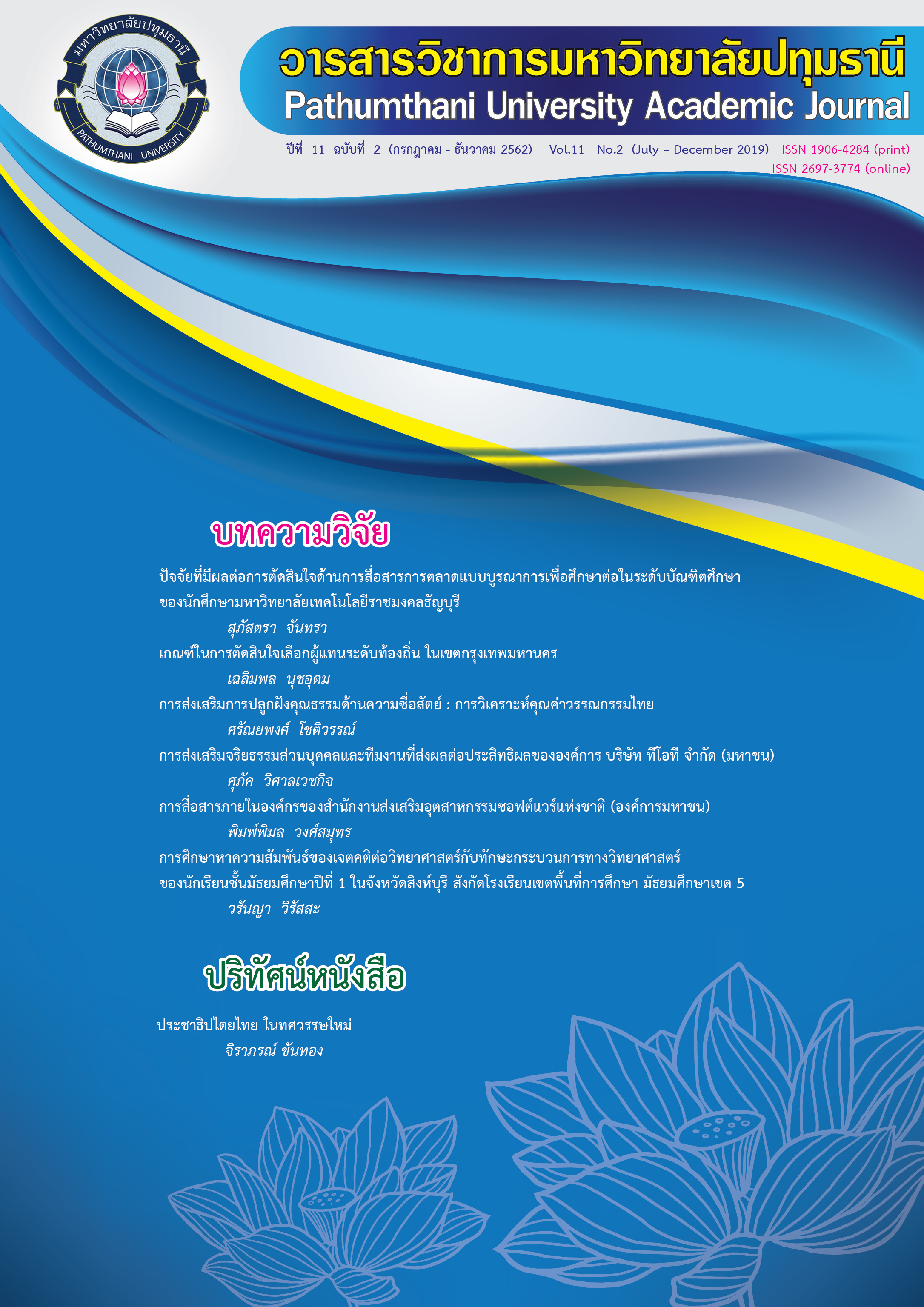Factors Affecting Corporate Social Responsibility of Wat in Pathumthani Province : A Case Study of Lad Lum Kaew District
Keywords:
Wat Management, Corporate Social ResponsibilityAbstract
The objectives of this research were to study opinions on corporate social responsibility and factors relating to wat management, in accordance with corporate social responsibility. The size of the sample was based on the Krejcie and Morgan table (1970). Convenient sampling was the technique used to select the sample of 226. A questionnaire was the instrument used for data collection. In addition, qualitative study was conducted by interviewing 9 key informants (The monks that have positions in wat management). Stepwise multiple regression was applied for hypothesis testing. The results of the study were as follows: 1.The opinions regarding corporate social responsibility was at the high level. This included resource management, organizational management, work planning, supervision, personnel management and internal control, within the wat. 2.The opinion regarding principles of corporate social responsibility was at the middle level. This included ethics, respect for the rule of law, accountability, respect for human rights, respect for the interests of stakeholders, transparency and respect for international norms. 3.Factors affecting corporate social responsibility of wats in Pathumthani Province (A case study of wats in Lad Lum Kaew) were organizational management, planning supervision and internal control, within the wat. 4.The results of qualitative study on corporate social responsibility principles were as follows: 4.1Accountability: There should be a reciprocal relationship between a wat and people in its community. A wat is considered a moral leader. Nevertheless, there were no people participating in wat management. 4.2Transparency: The existing rules and regulations were insufficient for systematic financial management. 4.3Ethics: A wat is a leader for ethics. The duty of monks is to disseminate Dhamma teaching. However, some monks’ behavior has deviated from Dhamma disciplines. 4.4Respect for stakeholder interest: No respect for stakeholder, a number of wats were rich, but local people were poor. 4.5Respect for international norms: The Sangkha administration should be decentralized so that problem solving would be more efficient. 4.6Respect for human rights principles: In principle, all Buddhists behavior can equally follow Dhamma teaching, except being ordained (which is allowed only for men). However, women can become nuns. 4.7Respect for the rule of law: The key informants considered the rule of law as the most important principle for wat management. Not only Sangkha principles, but also secular laws, should be respected.
References
จุมพล สวัสดิยากร. (2520. หลักและวิธีวิจัยทางการสังคมศาสตร์. กรุงเทพมหานคร : โรงพิมพ์จุฬาลงกรณ์มหาวิทยาลัย.
ธีรยุทธ บุญมี. (2541). ธรรมรัฐแห่งชาติ ยุทธศาสตร์กู้หายนะประเทศไทย. กรุงเทพฯ: สายธาร.
สุวรรณ พระมหาอนุศักดิ์ จันทราลักษณ์. (2544). ปัญหาและแนวทางแก้ปัญหาการบริหารจัดการวัด
ของเจ้าอาวาสในจังหวัดมหาสารคาม. รายงานการค้นคว้าอิสระ ปริญญาการศึกษาดุษฎีบัณฑิต,สาขาการศึกษานอกระบบ, มหาวิทยาลัยมหาสารคาม.
วรพงศ์ มหาโพธิ์ (2547). การพัฒนาชุมชนว่าลักษณะองค์การที่มีประสิทธิภาพ. วิทยานิพนธ์มนุษย์ศาสตรดุษฎีบัณฑิต. มหาวิทยาลัยรามคำแหง
อารยา กอบความดี. (2552). การบริหารวัดตามหลักธรรมาภิบาล: กรณีศึกษาวัดสามพราน จังหวัด นครปฐม. วิทยานิพนธ์ปริญญาพุทธศาสตรดุษฎีบัณฑิต มหาวิทยาลัยมหาจุฬาลงกรณราชวิทยาลัย.
มนัส ภาคภูมิ และคณะ (2540). การพัฒนารูปแบบการจัดการการศึกษาพระปริยติธรรม แผนกสามัญศึกษา. กรุงเทพฯ : กองแผนงาน กรมการศาสนา.
Krejcie, R. V. & Morgan, D. W. (1970). “Determining Sample Size for Research Activities”. Educational and Psychological Measurement. Vol.30(No.3), pp. 607-610.
Downloads
Published
How to Cite
Issue
Section
License
บทความที่ได้รับการตีพิมพ์เป็นลิขสิทธิ์ของวารสารมหาวิทยาลัยปทุมธานี
ข้อความที่ปรากฎในบทความแต่ละเรื่อง เป็นความคิดเห็นส่วนตัวของผู้เขียน กองบรรณาธิการไม่จำเป็นต้องเห็นด้วยเสมอไป และไม่มีส่วนรับผิดชอบใด ๆ ถือเป็นความรับผิดชอบของผู้เขียนแต่เพียงผู้เดียว



